
TUESDAY




TUESDAY


By Ayden Oredson Sports Reporter
Texas State adds to the NCAA conference realignment craze as the TSUS Board of Regents approved the Bobcats to join the Pac-12 conference starting in the 2026-27 year.
At 9:30 a.m. the TSUS’s Board of Regents held a Special Called Meeting regarding Texas State’s University’s discussions with another athletics conference. After a brief recess
with the meeting entering Executive Session, the board approved the motion with no objections.
The board approved a $5 million payment to the Sun Belt Conference for Texas State’s exit fee.
Texas State made arguably its biggest move in school history since first moving up to the Football Bowl Subdivision in 2012 today as Texas State is set to become the league’s ninth overall member and eighth football member. They join the likes of
The Pac-12 had been looking at the Bobcats since at least September 2024, when ESPN Reporter Pete Thamel reported they expressed interest along with the Mountain West sending a verbal offer. Texas State declined the invitation to join the Mountain West and there had been little chatter besides rumors that had been popping
By Cady Clements Life and Arts Reporter
Old friends reunited, laughter filled the air and energy buzzed through Private Park as Alchemy Records entered into a new season.
Alchemy Records, once a home for experimental music, punks and everything in between, returned on June 14 as the Alchemy Collective, a new effort to keep the spirit of Alchemy alive. The Alchemy Collective is a group booking shows like the ones previously put on at Alchemy Records, in a decentralized way.
Alchemy Records was a local record shop off The Square that put on concerts for the genres of music that don’t normally get stage time in San Marcos. It evolved into more than a record shop or venue, becoming a shared space where people in the alternative and DIY music scenes could make friends and have a good time.
After the final packed show at Alchemy Records on April 26, a community who lost their second home became determined to keep the legacy alive and well. Seeing its effects on the community fueled Evelyn

Middleton, Deerspine band member and a local organizer who previously booked shows at Alchemy Records, to keep it going.
“All of a sudden this massive thing people relied on... didn’t exist anymore,” Middleton said. “There needs to be something that people can reliably go to meet and talk to other people.”
Middleton believed Alchemy’s efforts to foster community were worth working for. Along with Angel Gorostieta Perez, former Alchemy Records cashier and sound tech, they could keep booking shows in a decentralized way, beyond the four walls of Alchemy Records.
“Instead of having a specific venue, we’re trying to put shows on at a series of different businesses and locations within the city,” Middleton said.
Planning for the Alchemy Collective started soon after Alchemy Records closed. Middleton and Gorostieta Perez spoke with Alchemy Record’s owner for permission to use the namesake. They looked for places willing to host a show and bands willing to play at them. Posts on social media went out about the launch of Alchemy Collective, giving hope to the community.
up online since mid-January. Recently, those rumors grew louder before ultimately culminating in another Thamel report posted in the evening of June 15 that confirmed the Bobcats were heavy favorites to receive an invitation for the Pac-12, one that could kick off a series of realignment moves affecting the Sun Belt and Conference USA.
By Lesdy Hernandez News Reporter
Spin electric scooters and bikes will end services in San Marcos and Texas State University due to low ridership levels on June 30.
In September, San Marcos, in partnership with Texas State University, signed a contract with Spin, a micro-mobility company, launching dockless electric scooters and bikes throughout the city and TXST campus.
Micro-mobility services are small lightweight vehicles aimed to provide more accessible, sustainable and affordable ways of transport.
Multimodal Parking Initiatives Manager Charles Campbell said prior to cancellation of the contract, San Marcos spent and maintained between 250 to 300 units of Spin devices, with amounts fluctuating on operational usage.
“The program resulted in an estimated reduction of 18,000 kilograms of CO2 emissions,” Campbell said. “It helped ease congestion by reducing the number of vehicles on the road and offered a viable alternative to personal vehicle usage, and it expanded transportation options for low income households and third shift workers,”
Tuesday, July 1, 2025
By Ryan Claycamp News Editor
In response to criticism and concern from members of the community, the San Marcos Police Department (SMPD) has established a policy for the use of License Plate Reading cameras (LPRs).
The policy comes after community members expressed concerns about mass surveillance and other law enforcement agencies being granted access to San Marcos’s LPRs. Due to the criticism, city council rejected purchasing additional cameras during its June 3 meeting.
“There is no reason that San Marcos needs to have 33 flock cameras. The city of Austin, with the population tenfold of that of San Marcos only has 40 and allowing our police department to operate 33 cameras, just seven less than Austin, which I learned today is the city with the most Flock cameras in the state, is complete overreach,” San Marcos resident Sam Benavides said at the June 3 meeting.
Concerns around the sharing of data with other agencies came after reports of other agencies using LPR data for non law enforcement purposes surfaced, such as in Wichita, Kan., where their police chief used LPRs to stalk his ex-girlfriend.
There were also concerns about how the LPR data was being handled and that SMPD’s LPR data could be used for immigration enforcement.
SMPD’s new policy, which went into place on June 12, but was not formalized until Friday, June 28, halted all automatic sharing of LPR data. Now, other departments wishing to access San Marcos’s LPR data must confirm that it is part of a specific criminal investigation, submit a formal
request form and sign a non-disclosure agreement before the data can be released.
“Turning off automatic data sharing with other law enforcement agencies allows the department to audit its own personnel directly,” the city wrote in a press release emailed to The Star. “All inquiries into the ALPR system must now be tied to an active investigation and users will be required to enter both a reason for the inquiry and an associated case number.”
According to the policy, the case must be: at least a Class B state offense or above, related to a missing or endangered person, a stolen vehicle, hate crimes, sex crimes or a be on the look out (BOLO) report, such as an Amber or Silver alert.
As well as stopping automatic sharing, SMPD also deactivated five of the LPR cameras they were using. According to their press release, that leaves them with 14 operational LPRs.
The policy also requires annual audits to the LPRs uses and ensures it is only for investigative purposes. Furthermore the city’s legal team is working with FLOCK, the provider of the LPRs to ensures that data is not collected unless the city requests it.
“Building and maintaining public trust is fundamental to our mission,” San Marcos Police Chief Stan Standridge said in a press release about the new policy. “As we leverage FLOCK ALPR technology to enhance community safety, we will ensure that clear expectations and usage protocols for FLOCK ALPR data are regularly communicated and understood throughout the department, reinforcing our commitment to privacy and responsible data stewardship.”
Council member Amanda

Rodriguez said she is “cautiously optimistic” about the changes.
“I truly appreciate my colleagues who opposed expanding mass surveillance technology, especially given today’s political climate,” Rodriguez said. “We must think beyond potential benefits, but also acknowledge the harm that can result when technologies are implemented without transparency and oversight.”
According to Rodriguez, nearly 700 law enforcement agencies outside of San Marcos had access to the LPR data.
“That level of access without clear parameters is unacceptable,” Rodriguez said.
Rodriguez said even though the new policy requires LPR data only be shared for actual investigations, she worries they could still be used for cases outside of SMPD’s jurisdiction, or in cases like the recent raid in
Dripping Springs, where the alleged wrongdoing was not proven.
“With the newly implemented restrictions on data sharing and clearer council-approved guidelines on what constitutes permissible use, I’m hopeful that this data will only be used for investigations strictly within the scope of our department’s authority,” Rodriguez said.
Rodriguez said there was no possible LPR policy that could fully address her concerns.
“For decades, we’ve seen signs of a broader shift toward criminalization over care, and I refuse to be the kind of policymaker who offers a false sense of safety through surveillance,” Rodriguez said. “The reason no policy here can fully satisfy my concern is because those concerns stem from a deeper issue, which is our failure as a society to invest in real safety at its roots.”
By Arabella DiChristina News Reporter
Construction wrapped up on the last week of June on three major train routes in San Marcos, reinstating most quiet zones across the city.
According to the Federal Railroad Administration (FRA), cities and counties can establish quiet zones, where trains do not sound their horns if crossing a specified section that follows specific safety regulations.
In 2024, San Marcos heard the train horn for the first time since quiet zones were first established in 2015. The FRA found a handful of train crossings that were no longer up to code.
Senior Project Engineer Rey Garcia wrote that on the Hopkins intersection, the medians were replaced with 6-inch-high curbs and medians, and on McCarty, Centerpoint and Posey was replaced with 8-inch curbs.
“Each intersection is
evaluated for safety and used in a calculation to verify quiet zone compliance,” Garcia wrote. “Annual inspections with an associated checklist will be implemented to ensure all intersections are compliant.”
According to the press release from San Marcos, the city has 28 train crossings being designated as quiet zones, all situated along four main train routes: Austin Mainline 1, Austin Mainline 2, Lockhart and Bobcat Drive/Uhland Road. However, Bobcat Drive/Uhland Road was not a part of this construction update.
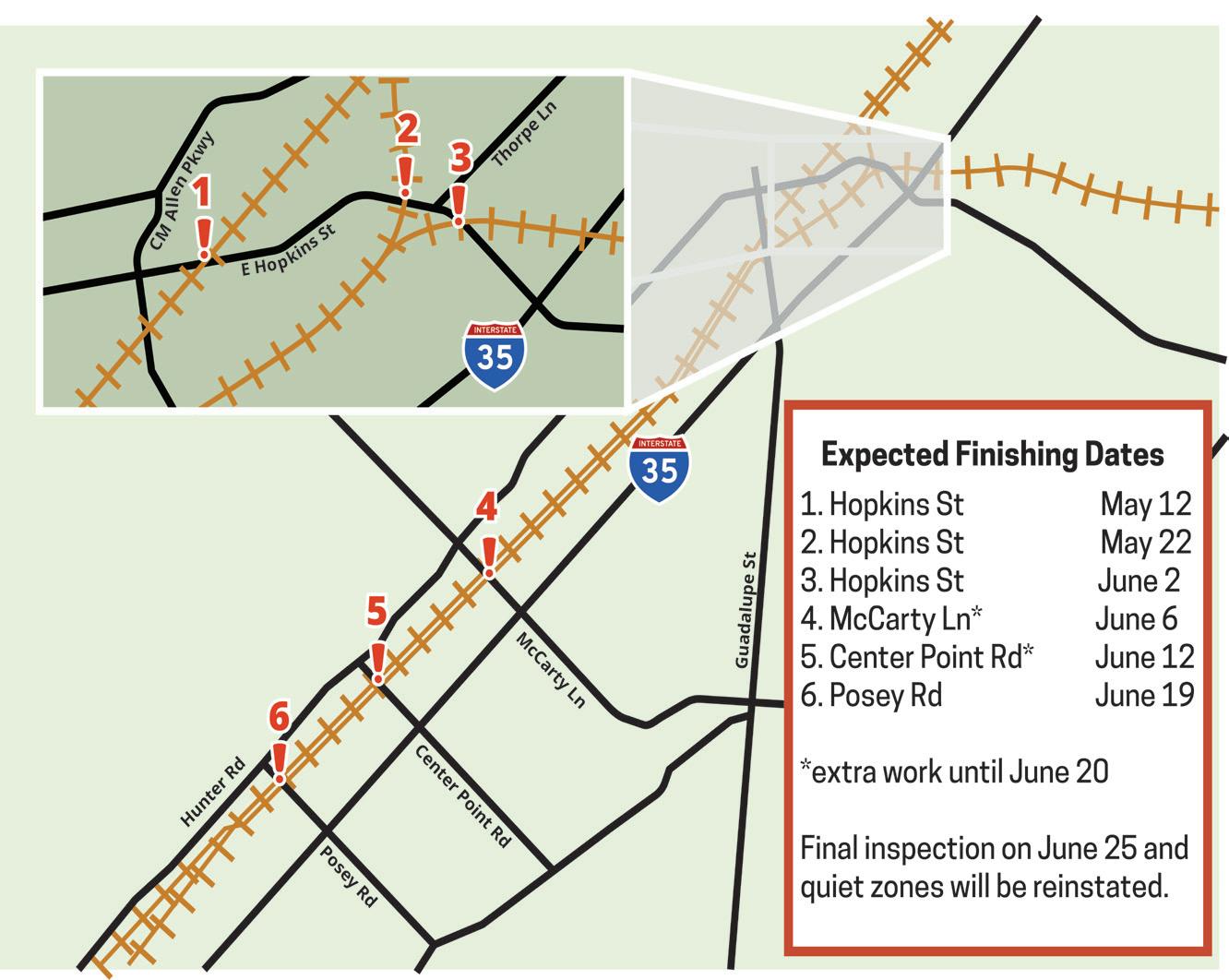

Trinity Building 203 Pleasant St. San Marcos, TX 78666 (512) 245 - 3487
Editorial Staff
Editor-in-Chief: Blake Leschber stareditor@txstate.edu
Managing Editor: Rhian Davis starmanagingeditor@txstate.edu
News Editor: Ryan Claycamp starnews@txstate.edu
Life & Arts Editor: Carlene Ottah starlifeandarts@txstate.edu
“The Bobcat Drive and Uhland Road intersections were not included due to the upcoming construction of the LP 82 overpass during the time of quiet zone establishment,” Garcia wrote.
Garcia wrote that another project is underway that will continue the quiet zone up to the Uhland Road intersection.
Along with the new raised medians, all updated crossings include signage such as “No Train Horn” signs and striping that indicates stopping.
The median replacement project was inspected on June 26 and was covered under a public improvement project. Garcia wrote that a punch list, which includes the completed updates such as minor signage, striping, and median work, has been created and is currently being installed.
The press release said the extended work was due to the complex permit process, however, San Marcos addressed the permit issue in an older press release.
“The city had planned to submit a single Maintenance Consent Letter (MCL) permit for construction, but Union Pacific required the City to submit two separate permits to complete the necessary work,” according to the older press release.
According to Garcia, the American Rescue Plan Act (ARPA) funds were used to build the median, signage and striping phase of work, and city funds will be used to continue the quiet zone toward
Sports Editor: Adrian Ramirez starsports@txstate.edu
Multimedia Editor: Meg Boles starmultimedia@txstate.edu
History: The University Star is the student newspaper of Texas State University and is published every Tuesday of the spring and fall and once a month in the summer semesters. It is distributed on campus and throughout San Marcos at 8 a.m. on publication days with a distribution of 3,000. Printing is by the New Braunfels Herald-Zeitung. Director: Laura Krantz, laurakrantz@txstate.edu
Read more at universitystar.com

Opinions Editor: Andrew Bencivengo staropinion@txstate.edu
Design Editor: Jen Nguyen stardesign@txstate.edu
Engagement Editor: Tatum Pou starengagement@txstate.edu
PIR Director: Abraham Gonzales starpr@txstate.edu
Creative Service Director: Carson Rodgers starcreative@txstate.edu
the Uhland Road intersection.
The FRA required other public safety measures, like raised medians, gate systems and signs, to be implemented to make a quiet zone; however, conductors are allowed to sound the horn in cases of emergencies.
Rachael Rowly has lived two miles from the Hunter Road and McCarty train crossing for 19 years and said that the train horn is a constant in the background noise.
“The construction has been aggravating…but I’m grateful that they only have one section closed at a time,” Rowly said.
Rowly said that she always found the train horn comforting; however, she can understand how it can be intrusive to the houses right next to the train crossing. She said that without the train horn, her neighborhood would go back to hearing the highway and the breeze.
Publication Info
Copyright: Copyright Tuesday, July 1, 2025. All copy, photographs and graphics appearing in The University Star are the exclusive property of The University Star and may not be reproduced without the expressed written consent of the editor-in-chief.
Corrections Policy: Errors appearing in the pages of The University Star and brought to our attention will be corrected as soon as possible.
Advertising Inquiries Contact at: 512-245-3487 advertising@universitystar.com
By Ryan Claycamp News Editor
A district judge in Travis County overturned the Hays County Road Bond Election on June 23, for violating the Texas Open Meetings Act (TOMA).
The ruling by 419th District Judge Catherine Mauzy comes after four Hays County residents sued over the handling of the call for a bond election in November 2024. The bond would have allocated $439 million towards a planned 31 road projects across the county. The road bond was passed by the voters 55.76-44.24%.
Mauzy ruled in a summary judgment, meaning she ruled without a jury and without a dispute in the facts of the case, that the bond election was improperly called due to it being improperly labeled on commissioners court agendas and because members of the community were not given enough time to discuss the proposed projects.
“Because the Hays County special proposition for Proposition A road bonds on Nov. 5, 2024 was never lawfully ordered by the Hays County Commissioners Court agenda item K.2, the Court declares the election void,” Mauzy wrote in the ruling.
The ruling further enjoins the county from taking any action that is”dependent on voter approval” related to the road bond.
The lawsuit, filed by Hays County residents Les Carnes, Jim Camp, Cathy Ramsey and Gabrielle Moore was initially filed in Hays County, but was consolidated with another lawsuit which Hays County attorneys filed in the 419th Districts. According to Bill Aleshire, the attorney for the plaintiffs, Hays County’s lawsuit was filed so the county could move forward with issuing the bonds.
According to Aleshire, this was only the second time in state history that a TOMA violation was ruled as grounds to overturn an election.
“Hays County had a meeting notice in August of last year that said, call a bond election. They did not say that the bond election was only about roads which are [of] a special interest in Hays County,” Aleshire said. “It didn’t indicate how much it was, or the fact that it caused the tax increase, or the fact that there were 31 individual projects.”
In a comment under a video response to the election being overturned, Hays County Judge Ruben Becerra said the District Attorney’s Office had said the wording of the agenda item was valid.
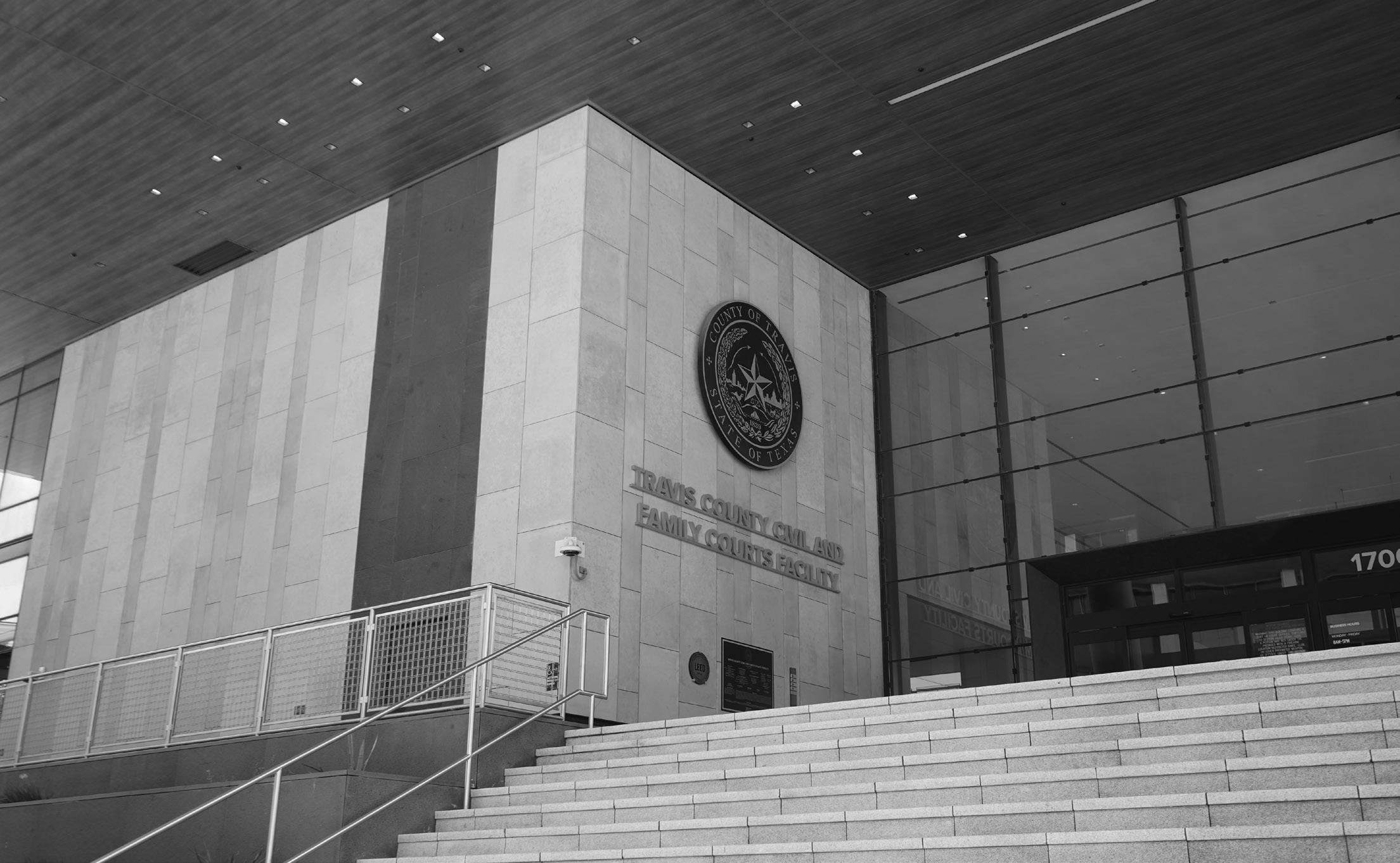
“Our DA’s Office, which manages the agenda, assumed the wording was solid—other agencies had used the same approach. But this time, it didn’t hold up. We’re taking the hit, learning from it and turning our focus to critical public health and safety priorities,” Becerra wrote in the comment.
Both Aleshire and Carnes said Becerra and other members of the court should’ve known better, as all elected officials in Texas receive TOMA training. Aleshire worked as a legislative staffer in 1973 when TOMA was revised and served as the Travis County Judge for 12 years, meaning he is very familiar with the act.
“When you become a commissioner ... you get training on what your duties of being a commissioner or county judge are, that includes this very important statute, [TOMA],” Carnes said. “The judge should have been paying more attention to all this, but he deferred to the district attorney, and now the judge is trying to point the finger at the district attorney as being the person that kind of created all this mess.”
In the video response to the election being overturned, Becerra said the county would continue to work on road projects most related to public health and safety, but could not work on all the projects covered by the bond.
“You may think ‘public health?’ Yes, there are roadways that can
In May, the city of San Marcos received a notice from Spin on its decision to cease operations at the end of its current contract set for June 30.
In a press release, the city reported a total of 322,634 rides on Spin devices since 2021.
TXST Transit Manager Rod Gonzales said although no problems with the service were reported, growing popularity in students buying
contain a lot of water, with mosquitos and West Nile... Public safety? Everyone gets that,” Becerra said. “We can’t have these tiny, narrow, dilapidated roads with no drop-offs and people getting hurt, or worse.”
Becerra said that he asked each commissioner to reevaluate the projects in their precincts to get a list of the most important projects related to public health and safety.
Becerra also said the county would create public committees to inform and provide feedback to the road projects. Part of the lawsuit was over the fact that no such committee had been established to guide the road bond project prior to the election.
“My office also suggested creating public committees, to engage the community and to ensure we were doing the work the Hays County residents wanted. This was successful during the POSAC bond, and unfortunately the majority on the Court refused,” Becerra wrote in the Facebook post that accompanied his video. “We shut the public out—and we’re now paying the price.”
Commissioner Walt Smith issued his own statement on Facebook after Mauzy’s ruling.
“Today is a sad day indeed for the citizens of Hays County. A TRAVIS County [District] judge chose to ignore over 100,000 of our citizens and side with Save Our Springs and nullify their votes, thus disenfranchising them and letting them know their choice didn’t matter,” Smith wrote.
their own electric scooters could be linked to Spin’s decision.
“I know, at the beginning, it was very popular, and then as electric scooters became more affordable, students and parents decided to buy one instead of renting one or charging one, and so I know that possibly could have been an impact to the Spin industry,” Gonzales said.
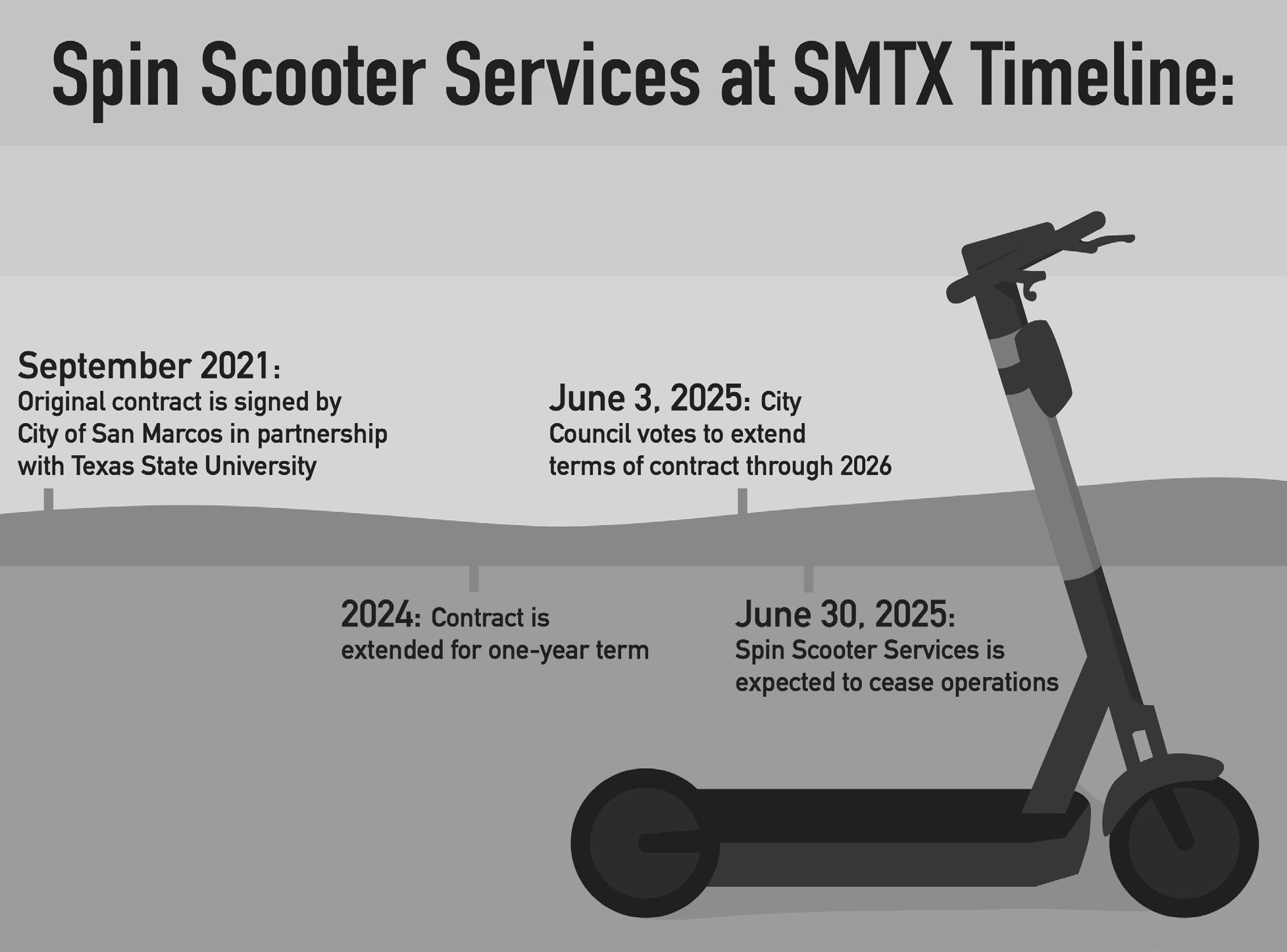
“Our transportation bond, backed by over 55% of Hays County residents was brought down in a court case by a special interest group from Austin on a technicality by a judge not even in our area.”
Both Carnes and Aleshire said they had initially filed the election lawsuit in Hays County, but that Hays County’s separate lawsuit related to the road bond caused a venue change.
“They combined our lawsuit with that lawsuit, and our lawsuit got transferred, not by our doing, but by Hays County’s doing, got transferred from Hays to Travis County,” Aleshire said. “Walt Smith didn’t know that, and he was out blasting the idea that there was that Travis County judge made the decision. Travis County judge made the decision because [Hays County’s] lawyers wanted it.” Smith also said that the Save Our Springs Alliance filed the lawsuit. While Save Our Springs was a party in the lawsuit, Carnes said that it was himself and the three other plaintiffs from Hays County responsible for the lawsuit. It remains unclear whether Hays County will attempt to appeal the ruling. According to Aleshire, commissioners court has 30 days from when the final ruling in the case was issued, which was on Friday June, 27, to vote on whether or not to appeal. The vote would occur during executive session in a commissioners court meeting.
On June 27, TXST faculty, students and staff received an email from TXST announcing the termination of Spin services in San Marcos and TXST campus.
“Texas State recognizes the importance of micromobility options for our students, employees, and visitors. As a result, we are working closely with the city of San Marcos to secure a new service provider as quickly as possible.” TXST stated in the email.
Spin cited low ridership levels, impact of traffic and unavailability of devices and port parts as reasons for the decision.
During its June 3 meeting, the San Marcos City Council voted to extend the non-exclusive license agreement for a one-year term, giving Spin the chance to reconsider the decision.
Campbell said while there will be an expected gap in service, plans to introduce future micro mobility transportation are underway with the city currently working on finding potential vendors.
“The city still does believe in the program, we’re committed to continuing the e-scooter and e-bike service and are currently working with Texas State to finalize and release a request for proposal for micro mobility services,” Campbell said.
Locals and students are encouraged to use the alternative modes of transportation available throughout the city such as TXST’s Bobcat Shuttle, Bike Cave, “The Bus” transport and rideshare services like Lyft and Uber.
Campbell recommends people with used Spin credits to contact Spin at support@spin.pm or at 1-888-262-5189.
Opinions in The University Star are not necessarily those of our entire publication, Texas State University’s administration, Board of Regents, School of Journalism and Mass Communication or Student Publications Board.
By Editorial Board
On May 25, Senate Bill 37 (SB 37) passed the Texas House of Representatives, following earlier approval by the Texas Senate on April 16. The bill was signed into law by Gov. Greg Abbott on June 22.
The bill threatens institutional integrity and academic freedom, historically core values of Texas higher education. Autonomy has allowed Texan institutions like Texas State to be nationally and internationally recognized as drivers of academic excellence and research contributions. Now, these pillars of education face significant risks.
SB 37 introduces significant changes to the governing structure of higher learning institutions in Texas, restructuring faculty senates, enhancing the authority of university system regents over curricula and degree programs and establishing new oversight mechanisms through the Texas Higher Education Coordinating Board.
The bill expands the Texas Higher Education Coordinating Board’s authority to approve, deny or eliminate degree programs based on workforce demand, graduate employment rates and state-defined priorities. Statedefined priorities are perhaps the most concerning, as they allow the politicization of education, with the current goals of an administration potentially leading to the elimination of degrees regardless of value. The bill’s broad text makes this risk even more uncertain.

Here at Texas State, degrees in philosophy, diversity studies and women’s and gender studies could be among the first targeted, as these fields tend to produce less positive employment metrics and may act counter to the state’s priorities.
“What I’m really worried about right now is the growing political reach into what’s actually taught at our universities. We need to be really careful,” Rep. Erin Zwiener (D-Driftwood) said. “Freedom of speech exists for a reason, and academic freedom is a vital part of that. We don’t want people in the classroom being forced to stick to one particular political ideology. Our students deserve to be exposed to a diversity of ideas.”
According to the bill’s text, “Each public university must annually report any changes to its general education curriculum to its governing board, which may overturn those decisions.” This inherently threatens the core principles of higher education as
independent centers of learning and research, potentially degrading curriculum innovation and educational quality.
The bill’s author, Sen. Brandon Creighton (R- Conroe), frames SB 37’s provisions as necessary to “restore academic integrity and accountability,” and other proponents such as Rep. Matt Shaheen (R-Plano) claim that the bill will make degrees “more valuable.”
However, in effect, the bill is fundamentally opposed to these claims and will diminish academic integrity and undermine the value of a degree obtained in Texas. The bill erodes the academic integrity and institutional autonomy of Texas universities by allowing regents to overturn curriculum decisions, which opens the door to politically motivated course cuts.
Universities already have several measures in place to ensure accountability, such as faculty senates, that operate within the
structure of the university system to provide oversight and maintain academic standards. Superseding these decisions at the state level undermines the shared-governance principles that allow universities to flourish.
These harms are not simply conjecture but are seen in other states that have implemented similar measures. In May 2023, Florida enacted SB 266, a law that banned state funding for DEI programs and gave politically appointed boards increased control over degrees and curricula, measures very similar to SB 37.
Since being enacted, Florida’s higher education system has seen noticeable declines in academic freedom, the dismantling of DEI offices and rising faculty departures. These challenges have led to a federal lawsuit challenging the law’s constitutionality.
SB 37 poses a direct threat to the very principles that have made its universities successful by hindering academic freedom and institutional autonomy. By handing political appointees unprecedented control over curricula and degree programs, the bill risks turning Texas higher education into a political entity rather than an independent center of learning and research.
This bill will directly affect the students and faculty at Texas State, and the example of states like Florida must not be ignored.
By Andrew Bencivengo Opinions Editor
On Tuesday, June 10, the Hays County Commissioners Court unanimously adopted a resolution brought forth by Hays County Judge Ruben Becerra calling for due process and humane treatment of immigrants. Later in the month, Precinct 4 Commissioner Walt Smith proposed an additional resolution to expand the fair treatment “to all,” including Jan. 6 insurrectionists. The Commissioners Court rejected the resolution in its June 24 meeting.
While it is essential to uphold the rights of all individuals, Smith’s resolution drew criticism for equating immigrants in ICE custody with participants in the Jan. 6 insurrection on the U.S. Capitol. These two situations reflect fundamentally different issues. One involves individuals seeking refuge from governmental overreach, and the other involves individuals attempting to overturn a democratic election through force.
Conflating them undermines the distinct legal and moral considerations each case demands.
Becerra made this moral consideration clear in a Facebook post on June 20, writing, “Let me be clear: people from our community have disappeared under suspicious circumstances, taken by masked individuals claiming to be ICE agents, right here in Hays County. These are fathers, mothers, neighbors and workers. They didn’t storm federal buildings. They didn’t threaten law
enforcement. They didn’t call for the beheading of the Vice President or the killing of members of Congress. Yet they were treated like criminals, without due process or dignity.”
To compare these community members to violent insurrectionists is not only a misrepresentation of reality but also risks diluting the seriousness of both situations through politically charged rhetoric. The push for justice must recognize the distinction between the two groups, not muddle it.
Becerra’s resolution came after 40 people were detained by ICE in Dripping Springs back in April, with the FBI alleging those arrested were linked to the Venezuelan gang, Tren de Aragua. However, with a lack of publicly available information and minors being detained, the San Marcos community voiced concern when the arrests occurred.
Due to this public sentiment, on June 10, Becerra introduced his resolution urging “fairness, due process and transparency” in immigrant enforcement. This resolution fairly requests federal and local law enforcement to publicly disclose the identities, charges and whereabouts of those detained, thereby affirming due process rights.
After its adoption on June 10, Becerra wrote on Facebook stating “Today, the court stood on the right side of history. The resolution affirming the humane and constitutional treatment of all people has officially passed. This is a victory not just for Hays County but for the enduring values of our Republic. As your County Judge, I am proud that
we acted with courage, principle and fidelity to the U.S. Constitution.”
Becerra’s resolution affirmed constitutional rights like due process, assured to both citizens and immigrants. Hays County is home to a substantial immigrant population, with 9.5% of the population being foreignborn according to Census data, and the resolution reaffirmed the county’s commitments to justice as well as answering community concerns.
In contrast, Jan. 6 protesters, granted clemency by President Donald Trump on Jan. 20, 2025, were given due process and followed standard federal procedures. These same legal rights have not been extended to all ICE arrestees. Jan. 6 defendants’ identities, charges and court proceedings have been public and transparent, with trials, plea deals
and appeals conducted openly. Smith’s resolution failed; however, the implications must not be ignored. Immigrants are vital members of our community who live and work among us, whose constitutional rights to due process and humane treatment must never be trampled.
Their pursuit of safety for immigrants stands in stark contrast to the Jan. 6 insurrectionists, who deliberately assaulted our democratic institutions and threatened law enforcement. A commitment to justice means recognizing these crucial differences and ensuring fairness is extended to those least protected.
-Andrew Bencivengo is a management junior
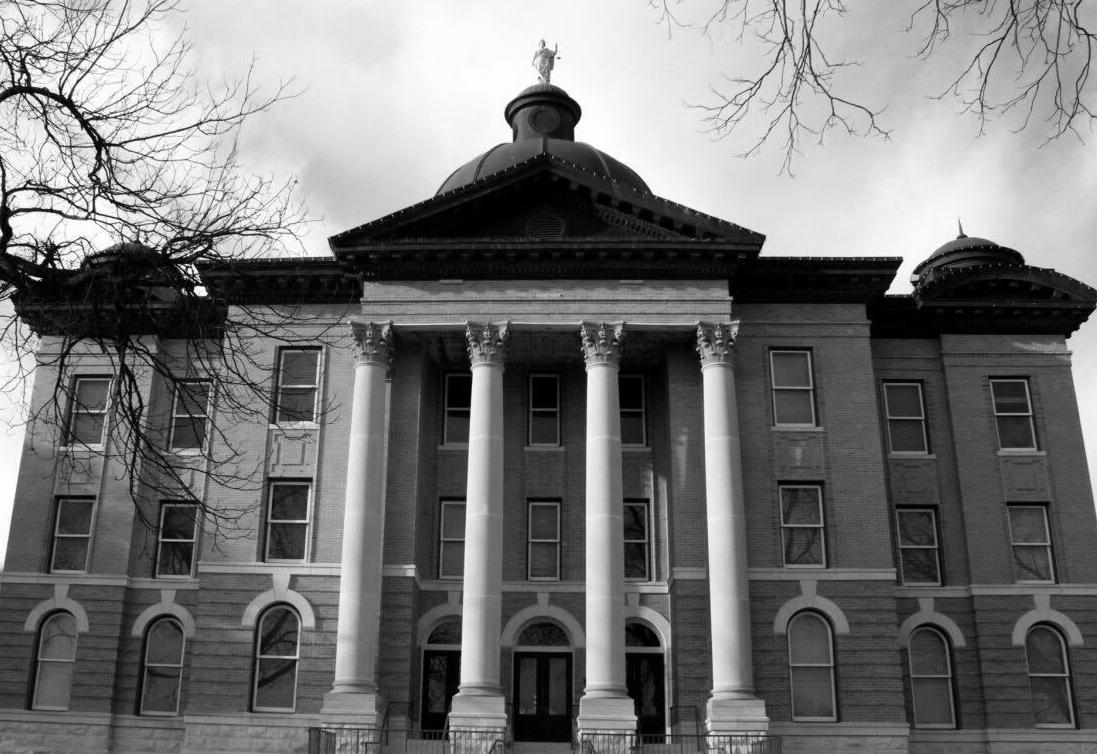
By Adrian Ramirez Sports Editor
The NCAA baseball season officially ended on June 22, but for Texas State, the season came to an end far sooner. A 4-2 loss to Troy exactly one month earlier on May 22 signaled the end to yet another disappointing season for Bobcat baseball
With losing comes consequences and they began to show for Texas State baseball very quickly.
Just five days after the Bobcats’ season came to an end, Friday night starter Alex Valentin announced on social media that he is entering his name into the NCAA transfer portal, starting the domino effect that ensued. Less than an hour after Valentin’s announcement, Matthew Tippie, a staple of the Bobcat bullpen, announced his entry into the transfer portal as well. Before the day ended, perhaps the biggest announcement came in the form of Ryne Farber, who, after two successful seasons as a Bobcat, entered his name in the transfer portal as well.
In his lone season as a Bobcat, Valentin went 5-5 with a 6.12 ERA. Although Valentin didn’t have the strongest end to his season, he was arguably the best pitcher on the Bobcats’ staff through the middle stretch of the season, which is why he earned himself the Friday night role. With strong outings against

teams like Texas A&M, Coastal Carolina, Louisiana and Troy, Valentin undoubtedly upped his stock throughout the country.
Farber and Tippie both spent two years in San Marcos and were both crucial factors in whether the team would be successful. When Tippie arrived in San Marcos in 2024, he immediately became the high leverage, back-end bullpen guy for Texas State head coach Steven Trout. Tippie flashes electric stuff on the mound with a mid to upper 90’s fastball and an array of offspeed pitches to go with it. In 46.0 innings of work,
According to Thamel’s report on June 15, Texas State had been the Pac-12’s target for months, with one main reason being the establishment of a foothold in Texas. It helps that Texas State is right in between two fast-growing cities, Austin and San Antonio.
With this move, seven of the 10 FBS conferences will have a team in Texas. This will also be the ninth school out of the 13 FBS teams in Texas that has changed conference allegiances since 2021 when UT-Austin started the domino effect by making the jump from the Big 12 to the SEC.
Initially, the conference was focused on adding schools from the American Athletic Conference (AAC), namely Memphis and Tulane, along with South Florida and UTSA back in late 2024.
AAC schools could leave at $10 million but they had to report that they were leaving 27 months in advance. The deadline passed which resulted in the fees jumping to $25 million. Because financials played such a considerable part in the end, they stayed put and even jointly announced their commitment to the AAC.
When the AAC schools became unrealistic, the Pac-12 looked further at the Mountain West they had already poached from. Whilst they snagged five of the aforementioned schools above from the Mountain West, they were left just one member short overall.
Prior to Texas State’s addition, the Pac-12 had eight overall members, but only seven were full members. Gonzaga does not sponsor football, and the conference needed eight all-sports members by July 2026 to maintain FBS status.
Texas State’s Sun Belt exit fee stood at $5 million but would’ve jumped up to $10 million on July 1, as the conference requires only a one-year notice before a departure.
Joining the Pac-12 is a considerable upgrade in terms of the money Texas State will be receiving. The University Star is requesting a copy of the officially signed contract.
“We are extremely excited to welcome Texas State as a foundational member of the new Pac-12,” Pac-12 Commissioner Teresa Gould said in a June 30 press release. “It is a new day in college sports and the most opportune time to launch a new league that is positioned to succeed in today’s landscape with student-athletes in mind. Under great leadership from Dr. Kelly Damphousse, Don Coryell and excellent head coaches, Texas State has shown a commitment to competing and winning at the highest level as well as to providing student-
Tippie struck out an eye popping 73 batters. The only knock on Tippie is his command, as he has a tendency to give up the walk.
Farber was one of the few consistent bright spots in the Bobcat baseball program the last two years. Farber made the opening day roster as a true freshman and immediately validated Trout’s choice to pencil his name in. In 2024, Farber hit .340 with a pair of homers, 10 doubles, a triple and drove in 25 runs. Taking a slight step back in 2025, Farber only hit .267 but still seemed to be the guy wanted up to the plate in the big spot.
Both Farber and Tippie have since committed to schools in Alabama. Tippie was first to announce his commitment to the University of Alabama, Farber followed shortly after and announced his commitment to Auburn. The two former teammates will now be bitter rivals in what is widely considered the best baseball conference in the country.
Along with Farber and Tippie, Valentin announced his commitment to South Carolina, meaning all three will remain in the same conference as SEC foes next season.
Catchers Theo Kummer and Ian Collier, relievers Taylor Seay and Ryan Lawton, along with infielders Kutter Gage-Webb and Travis Bragg have all entered the transfer portal as well. While none of the aforementioned were everyday starters, their collective departures add more holes to an already thinning roster.
While much of the portal news regarding Texas State baseball has been players departing, Trout is still out there trying to make a splash. Former Texas first baseman Jaquae Stewart recently announced his commitment to the Bobcats.
While Stewart didn’t get a very many at-bats in Austin, he had a big 2024 at Northwest Florida State College where he slashed .346/.555/.743 with 15 home runs to go along with those numbers.
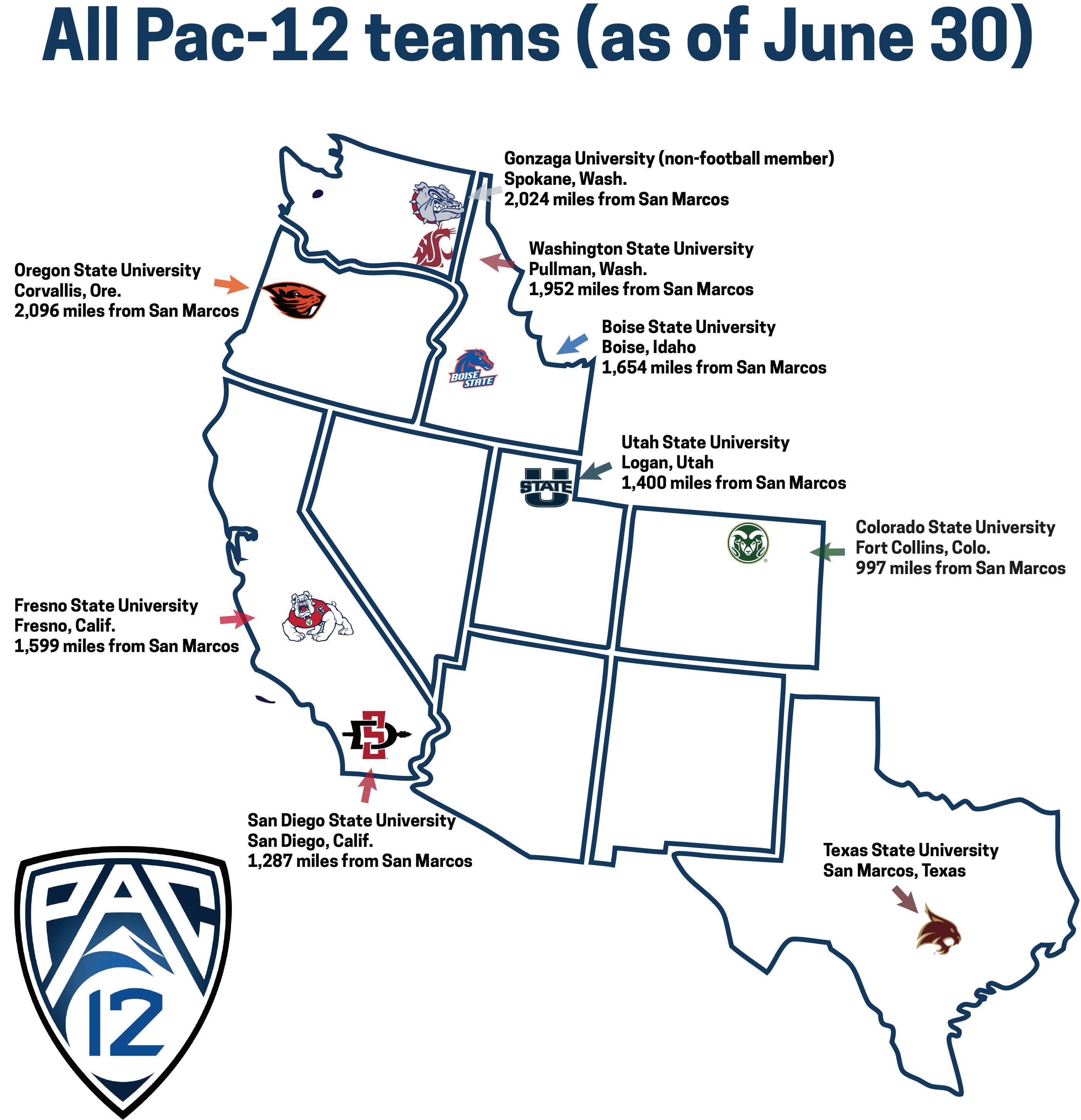
athletes with a well-rounded college experience academically, athletically and socially. We look forward to seeing the Bobcats’ future trajectory continue to shine big and bright.”
Texas State’s move is set to ignite a chain reaction of conference realignment moves. Most notably, with the Sun Belt’s likely plan of adding either Louisiana Tech or Western Kentucky as the replacement for Texas State.
The Bobcats will play one more full year in the Sun Belt Conference before making the switch to the Pac-12 on July 1, 2026. This is a developing story. The University Star
will provide updates as they become available.
Scan the QR code to keep up with Texas State sports.













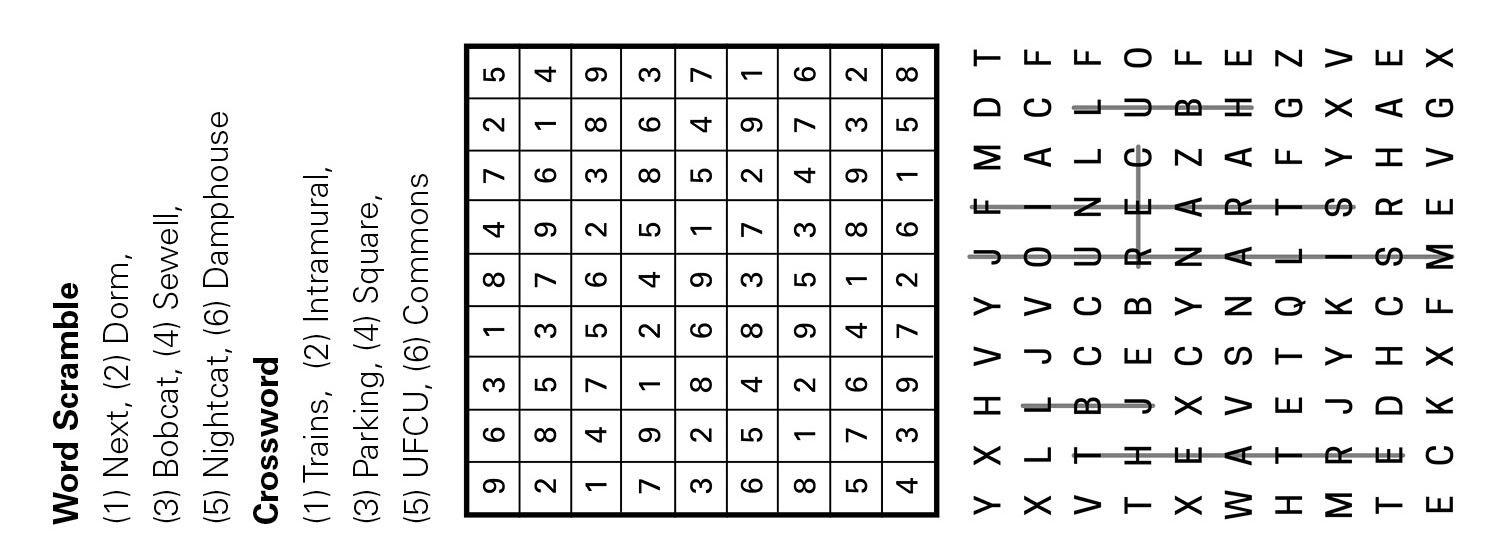
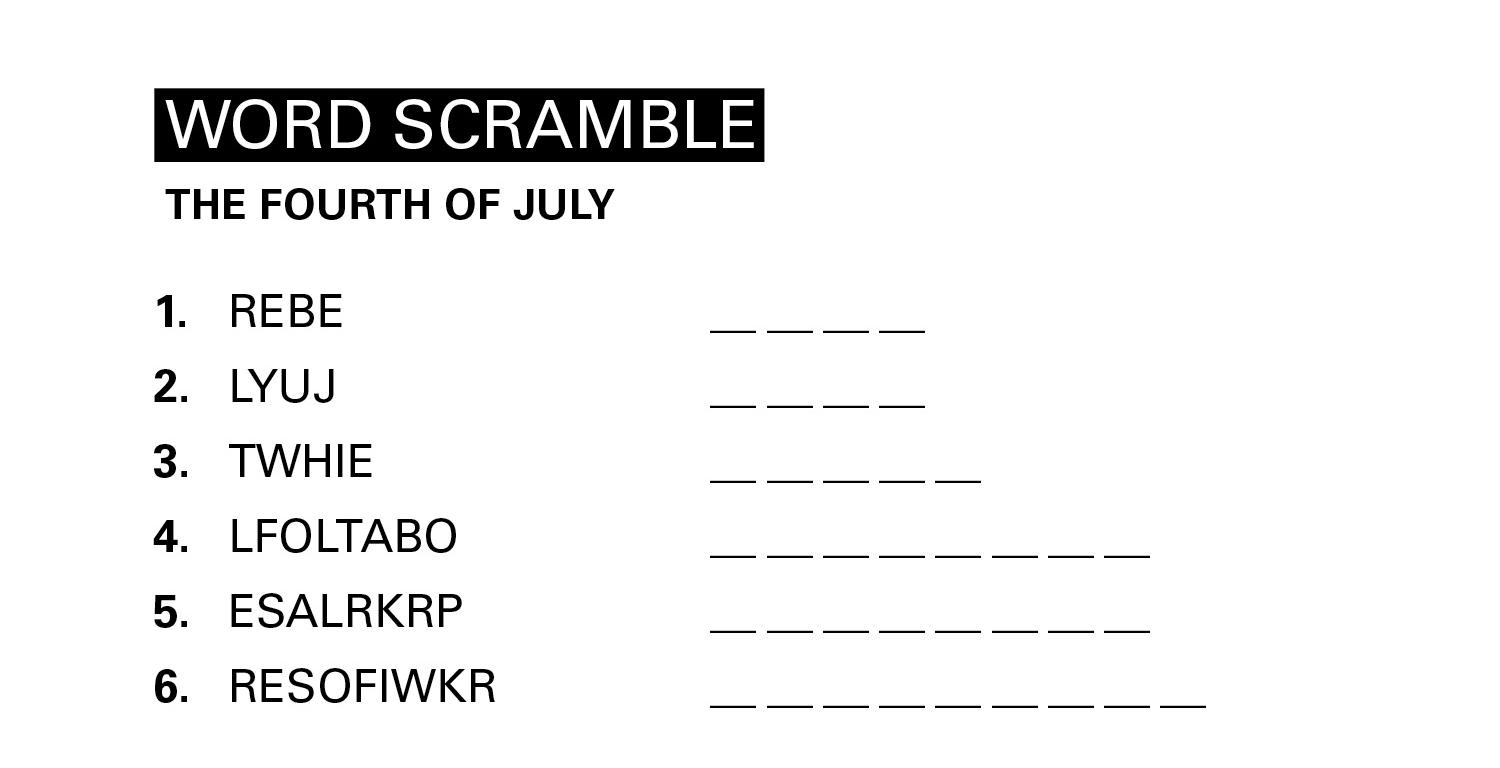


By Marvin Goines Life and Arts Reporter
“Karate Kid: Legends” is the latest installment in a franchise that began in 1984 with Ralph Macchio as the titular “Karate Kid.”
Sequels followed, and a reboot with Jackie Chan in 2010 introduced a new generation to the martial art of kung fu, rather than karate. Now, the two stories intersect with Ben Wang as Li Fong in the lead role. Unfortunately, even with the assembly of big names, “Karate Kid: Legends” is an unsatisfying retread of the past.
It’s disappointing that despite the incredible potential to explore a fresh idea, especially with Ben Wang’s talents, “Karate Kid: Legends” offered nothing new to audiences. The story kicks off just like the others: A boy moves far away from home with his mother, meets a nice girl and has to fight her bully ex in a tournament.
Aside from including Macchio and Chan in a collaborative teaching environment, “Karate Kid: Legends” clutches onto nostalgia in a chokehold so hard that it doesn’t allow the new tale to breathe. Perhaps a producer felt that doing the same premise would elicit the same results, (both of the earlier “Karate Kid” films were critical and financial successes) and maybe hoped that having the big names would be enough to carry it into a championship.
Too often, the film’s core messages jerked suddenly from scene to scene, never allowing the viewer to reflect on the supposed teachings. Li Fong is likable and relatable as a character, and the moments he processes trauma are among the few authentic flashes of good writing and directing. Yet even with the heavy weight on the young man’s shoulders, there is a general lack of artistic substance. In the final third of “Karate Kid: Legends,” the training montages and tournament sparring scenes are so erratic that the climactic fight felt rushed into existence. This isn’t to say that the fighting wasn’t up to par, but compared to the other
movies, the action took a back seat instead of getting a chance to dazzle and awe.

Although this was mainly nostalgia bait to entice the older crowds, seeing Ralph Macchio and Jackie Chan together on screen is a treat in and of itself. They work together to teach Fong how to utilize karate and kung fu to overcome a vastly more powerful opponent who is ruthlessly aggressive. The physical and verbal banter between Macchio and Chan works, and when we see them both in action, it’s one of the few sequences that elicits a legitimate audience reaction. How the two are introduced felt tacked on as the movie’s first half was going in an entirely different direction.
There are clear references to the franchise. They didn’t serve the story meaningfully except for being a “wink, wink, nudge, nudge” to viewers who’ve binged five films and several seasons of “Cobra Kai.” Thankfully, the respect for Miyagi (Pat Morita) remained intact through archival footage that was used tastefully. As much as the “Karate Kid” harps on the merits of honoring traditions and legacy, the regard for Miyagi was one of the most appreciated aspects of “Karate Kid: Legends.”
Ben Wang’s potential seemed to be through the roof, after his turn on the Disney+ series “American Born Chinese.” The young actor was on track to rise his star by scoring this role that was both fun and
serious in a major film/television franchise. Wang was excellent throughout “Karate Kid: Legends” but deserved a fresh and original story, rather than reliving the glory days of a stale formula that paints by the numbers. Marvin Goines is a film/TV critic who has been writing reviews on various types of multimedia since 2021. His work can be found on websites such as ‘The Cosmic Circus’ and ‘Movies We Texted About.’


In the heart of San Marcos, the Red Bus Food Park transformed into a lively, once-a-month vendor market that features local craft vendors, food trucks and live music for its Red Bus Bazaar event.
The monthly market, which goes from May to Sept., aims to bring together local entrepreneurs and visitors to enjoy an evening of shopping, local eats and entertainment.
John Wilkinson, Howdy Boba owner and Red Bus Bazaar event coordinator, brought the market to life by organizing special days at his shop for people to come together, including K-pop-themed events like Seventeen Day, which took place during the opening of Red Bus Bazaar on May 31 at the Red Bus Food Park on 801 Chestnut St.
“My favorite part is just seeing people come out and share memories, make memories and have a good time,” Wilkinson said. “It’s so great watching people bring their friends, bring their family and talk about how much my events, like the Red Bus Bazaar... are something they look forward to every month.”
The park was quiet for years, but due to new management, Wilkinson saw an opportunity to turn it into a place where locals could come hang out, eat and listen to live music.

“[Red Bus Food Park] has sat there for many years without much excitement or energy or anything,” Wilkinson said. “Having an event coordinator background, I wanted to bring some life to the park and help promote our shop and the other shops that are there.”
May was the first market at Red Bus Food Park. Wilkinson said it went well, recalling stores such as craft vendors, jewelry makers, artists and a mobile bookstore displaying their works.
Wilkinson hoped to bring more excitement by expanding his themed K-pop events and the Red Bus Bazaar. On June 28, Howdy Boba was decorated in purple in celebration of BTS as vendors lined Red Bus Food Park and visitors stopped by to get a specialty drink before making their way to the vendor market.
Barbara Gonzales, co-owner of The Trinket Besties, showcased her K-pop-themed items at the Red Bus Bazaar for the second time since it began. She said she and her business
partner became well acquainted with Wilkinson, so they returned because the last time went well.
Gonzales said joining the K-pop community and sharing her pieces at events with fans fostered shared connections.
“I hope [this event] expands us to more people, not only business-wise but also friendship-wise,” Gonzales said. “We’re just hoping to make more connections because I feel that’s important.”
“Being a part of [something that people customize is special],” Rojero said. “A lot of people come with their friends or significant other, and they get meaningful pieces. It’s a metaphor for the bond between people and the jewelry or the piece that they choose.”
Tammy Faulkner, a BTS fan and bazaar visitor, said the Red Bus Bazaar and K-pop events helped her connect with others who shared her love of BTS and K-pop.
“Anytime I can get around to talking to fans, it’s the best part. That’s why I love it so much,” Faulkner said. “When you can talk to a fan, you have so much in common. You can be five years old or 85 years old and there’s something in common because you like the same group, and you like the same music.”
As the night slowed down, visitors came together to watch a movie screening of a BTS concert to end BTS Day at the Red Bus Bazaar. The next Red Bus Bazaar event will be on July 26 from 4-9 p.m. at the Red Bus Food Park.
Wilkinson plans to expand the bazaar with more entertainment from July through September to bring more people together, including summer movie screenings each Saturday in July at 8 p.m. and custom drink and food specials.
“We just hope to see more and more people notice what we’re doing and come out for a fun time,” Wilkinson said. “I think when school starts, it’ll become a thing, and then I would love to have it go from being monthly to weekly if we can.”
For Karina Rojero, owner of Merakai Permanent Jewelry, it was her first time showcasing her business at the Red Bus Bazaar. She said the name of her business is a Greek word that means to act with love, passion and soul. Through her pieces, Rojero creates meaningful items unique to a person’s life and the special people in it.
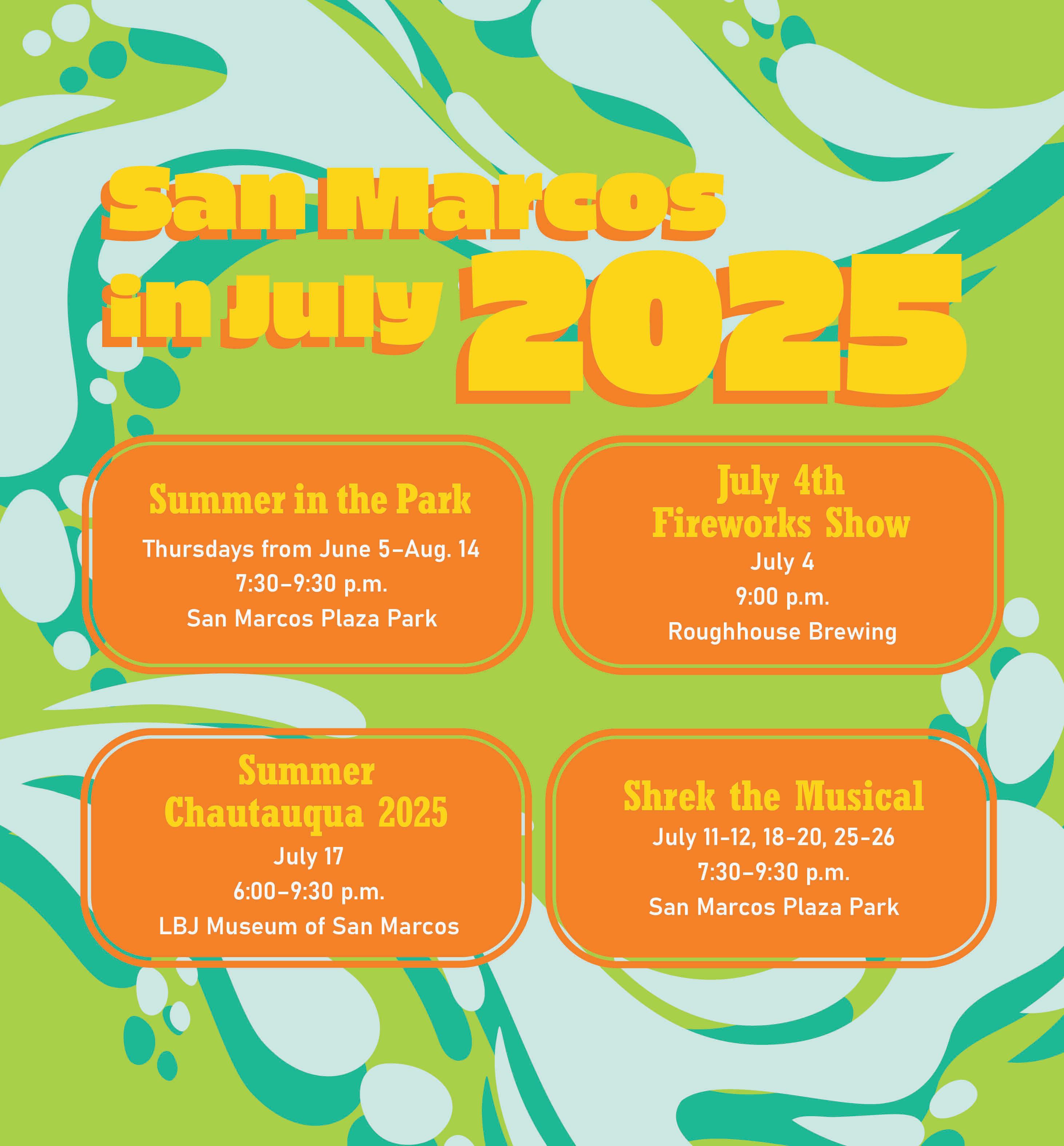
Gorostieta Perez was excited to bring diverse, avant-garde and progressive music into every corner of San Marcos. He believed there was more to it than putting on shows. It was also about making the DIY music scene unapologetically present and maintaining a community in San Marcos.
“[We want to put on shows] anywhere that we can get ourselves into,” Gorostieta Perez said. “We’ve had discussions about throwing hardcore shows at laundromats and doing weird stuff all around town for the sake of putting music out there.”
People gathered for a night unlike any other at Private Park, where the DIY music scene could take a breath of fresh air as they found a solution to Alchemy’s absence. The Alchemy Collective booked seven bands, including local favorites like Deerspine and My Dad Died, to play from 7:30 p.m. to 1 a.m. with attendees moshing and dancing all night long.
Vendors brought out a special Alchemy Records pop up where people browsed through various records from different decades. The
I’m hoping we can create the infrastructure to let the scene last and make the scene as easy as possible for more people to get into.”
Evelyn Middleton, local organizer of Alchemy Collective

Alchemy Collective ended the night with the country ballad “Neon Moon” by Brooks & Dunn as a tribute to the old Alchemy Records tradition. Folks danced as the night ended out, breathing a sigh of relief that Alchemy and its community never really left.
Nick Rangel, photography junior and frequent Alchemy patron, found a love for the alternative, DIY music scene in San Marcos while looking for his niche as a photographer. He believes the Alchemy Collective is the next big thing for the community and can’t wait to continue going to shows.
“Even beyond taking photos, connecting with the people that I know and the community that I love and introducing new people to that very
exciting thing, I would love to keep going to that as long as they have it,” Rangel said.
Middleton’s biggest goal for the collective is to expand its efforts and reach out to venues around town that appreciate the space the Alchemy Collective created and let it play shows. She wants the Alchemy Collective to feel like a collective for a greater cause rather than a few people working toward a safe space for experimental music.
“I really want to widen the net of people that we work with and make it an actual collective versus two people planning this thing,” Middleton said. “I’m hoping we create the infrastructure to let the scene last and make the scene as easy as possible for more people to get into and get involved with.”

Tuesday, July 1, 2025

The Ride of the Valkyries team begins the Texas Water Safari, a 260-mile canoe race from San Marcos to Seadrift, Friday, June 13, 2025 at 9 a.m., at the Meadows Center. The Ride of the Valkyries were the overall winners of the Safari, finishing the course at 11:19 p.m. Saturday, June 14, 2025, in just over 37 hours.
The Cowboys team begins the Texas Water Safari, a 260-mile canoe race from San Marcos to Seadrift, Friday, June 13, 2025 at 9 a.m., at the Meadows Center. The Cowboys placed fifth overall, finishing the course at 4:51 a.m. Sunday, June 15, 2025, in just under 44 hours.
The Texas Water Safari kicks off at Spring Lake in the Meadows Center, Friday, June 13, 2025, in San Marcos. Teams have 100 hours to complete the course that goes from San Marcos to Seadrift, which is a town on the Texas Coast.





A team begins the Texas Water Safari, a 260mile canoe race from San Marcos to Seadrift, Friday, June 13, 2025, at the Meadows Center. The canoe marathon began in 1963 and is considered the world’s toughest canoe race.
Scan the QR code to view the gallery online.
